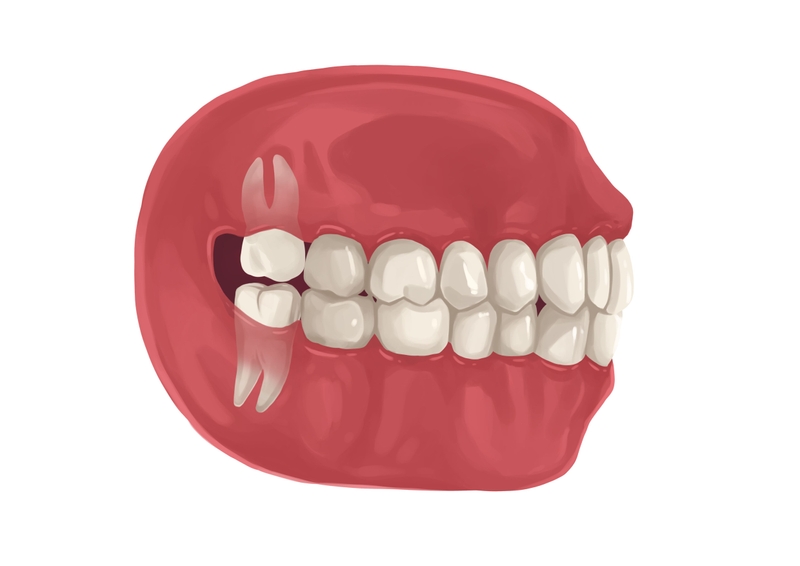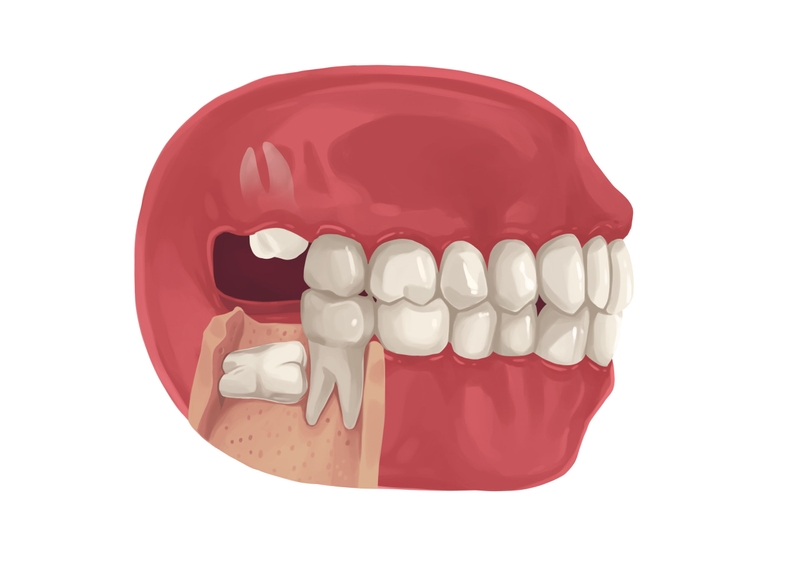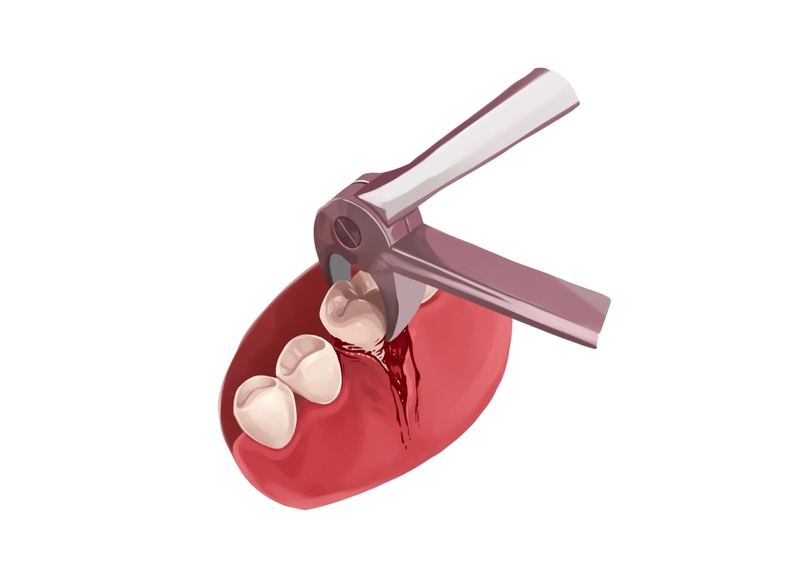- Wisdom teeth, or third molars, can be rather problematic in terms of growth and shape.
- Impaction, decay and gum disease are common reasons for wisdom teeth removal. 85% of all wisdom teeth will need to be extracted at some point.
- Before extraction, you should discuss the condition of your wisdom tooth with your dentist. Recovery can take up to a week.
Use Authority Dental to find and book a low-cost teeth extraction dentist near you. We offer transparent pricing and accept most insurance plans.
Do you need to have a wisdom tooth removed? Here's everything you need to know.
Is it necessary to remove wisdom teeth?
Your wisdom teeth should be removed when they cause health complications.
Healthy wisdom teeth

Picture by Authority Dental under CC 2.0 license
Although some people remove healthy wisdom teeth as a prophylactic measure, it is not always necessary. Wisdom teeth with no cavities or periodontal involvement and proper alignment and partnered with visiting your dentist for cleanings and examinations, wisdom teeth do not need to be extracted.
Impacted wisdom teeth

Picture by Authority Dental under CC 2.0 license
Impacted wisdom teeth mean they have properly erupted out of the gums and/or jaw. Several factors can lead to this condition such as lack of space in the jaw or teeth located in the incorrect position and angle.
Pain, swelling, infection and damage to neighboring teeth are some of the consequences of impacted teeth. In such cases, it may be necessary to remove the wisdom teeth. This will relieve the symptoms and further complications.
If your impacted wisdom teeth do not cause any of these problems, extractions may not be necessary.
Decay and gum disease
If you are wondering when to get your wisdom teeth extracted, decay or gum disease are crucial factors to consider.
Generally , dentists do not treat severe decay or gum disease of wisdom teeth and prefer to remove them before the conditions worsen and affect other teeth.
How are wisdom teeth removed?

Picture by Authority Dental under CC 2.0 license
The wisdom teeth removal process is considered a minor surgical procedure consisting of several steps.
Before removing wisdom teeth, the dentist or oral surgeon will give you local anesthetic. This numbs the area around your teeth. An incision may be made in the gum tissue to expose the tooth and bone
After examining the area, the doctor performs the necessary procedures to extract wisdom teeth. This may include applying pressure onto the tooth, utilization of oral surgery instruments and sectioning the tooth into parts to complete the procedure. The final step is cleaning the area and placing sutures at the dentist’s discretion.
How long does wisdom teeth removal take?
The length of the procedure depends on the complexity of the case. Severely impacted wisdom teeth may require over an hour per tooth for removal. In other cases, your doctor may remove your wisdom tooth within 40 minutes.
How long does it take to remove four wisdom teeth? Considering this time estimate, you may need up to four hours for the complete removal of all your wisdom teeth. Depending on your condition, your doctor may prefer to remove two wisdom teeth at a time.
What to do before wisdom teeth removal?
Talk to your dentist about wisdom teeth removal preparation and the timing of the procedure. A complete medical examination is highly recommended to ensure that you can undergo the extraction procedure and rule out any conditions that could interfere with the procedure.
Follow your dentist's instructions before the procedure. Prepare soft and liquid foods and have prescribed medications filled in advance if possible.
If your dentist is using general anesthesia, refrain from driving and have transportation arranged prior to the surgery.
Having a trusted adult who can assist after your procedure is recommended as well.
What to do after wisdom teeth removal?
Below are some recommendations you can follow to after wisdom teeth removal.
Sufficient sleep with elevated head
At least eight hours of interrupted sleep sleep with your head elevated above your heart is crucial. This will give your body time to recover, and an elevated position will reduce swelling and discomfort. Avoid sleeping on your stomach or side.
Avoid strenuous physical activities
Avoid all activities such contact sports and other strenuous activities. This could add stress to the surgery site and lead to complications such as dry socket.
Change your diet
Eat soft foods such as mashed potatoes, yogurt and applesauce. Avoid hard and crunchy foods to prevent irritation and hot food and drinks and drinking from a straw to prevent dislodging of blood clots prematurely. Lastly, avoid foods that could get into your stitches that can disturb wisdom teeth healing.
No alcohol and smoking
Refrain from drinking alcohol and smoking after wisdom teeth surgery. Both cause severe irritation, dry socket and slow down the healing process. Alcohol dissolves the blood clot whereas smoking creates suction that removes the clot.
Maintain proper hygiene
Keep the surgery area clean. This will help prevent infections and further complications.
Rinse your mouth with a mouthwash prescribed by your doctor. Gently brush your teeth with a soft toothbrush and gauze around the extraction site.
Avoid touching the stitches. Do not spit or rinse with water at least during the first days after the extraction. This may loosen the stitches.
Apply ice
Applying ice can effectively reduce swelling and tissue damage in the jaw and minimize discomfort associated with the wisdom teeth removal. Place an ice pack on the jaw for 20 minutes at a time.
Place a soft cloth between the ice and the skin. This will help prevent frostbite or cold burns.
Use pain relievers
Pain medication will help alleviate pain symptoms after wisdom teeth surgery. Take over-the-counter pain relievers such as ibuprofen and acetaminophen as needed and/or instructed.
Keep in mind that you should take only the painkillers prescribed by your doctor. Your doctor determines the best medications based on your medical history.
How long does wisdom teeth removal take to heal?
The wisdom teeth removal healing process depends on your individual health condition and age. If there are no complications, recovery takes between 3 to 7 days. Complicated surgeries such as impacted wisdom teeth removal may have longer recovery time. Compliance to after-surgery instructions will also determine the time required for recovery.
FAQ
Can I brush my teeth after wisdom teeth removal?
You should brush your teeth after wisdom teeth removal. Use a soft toothbrush and be gentle when brushing.
When can I start smoking after wisdom teeth removal?
Dentists do not recommend smoking after wisdom teeth removal. Smoking delays the healing process and increases the risk of complications such as infection or dry socket. It is best to wait at least 48 hours after the procedure before smoking.
Peter March, DDS
Mouthwash should only be used if prescribed. Rising with warm salt water is recommended.